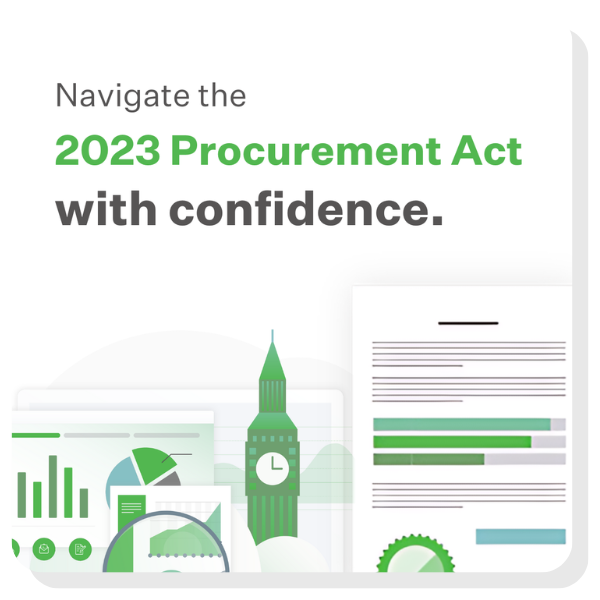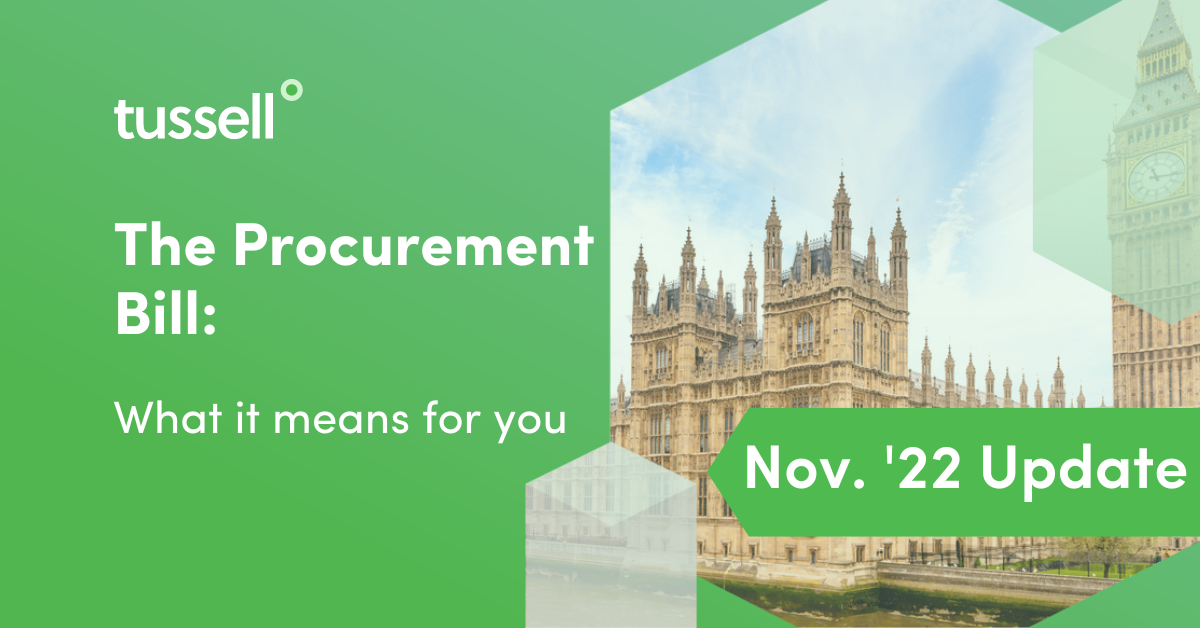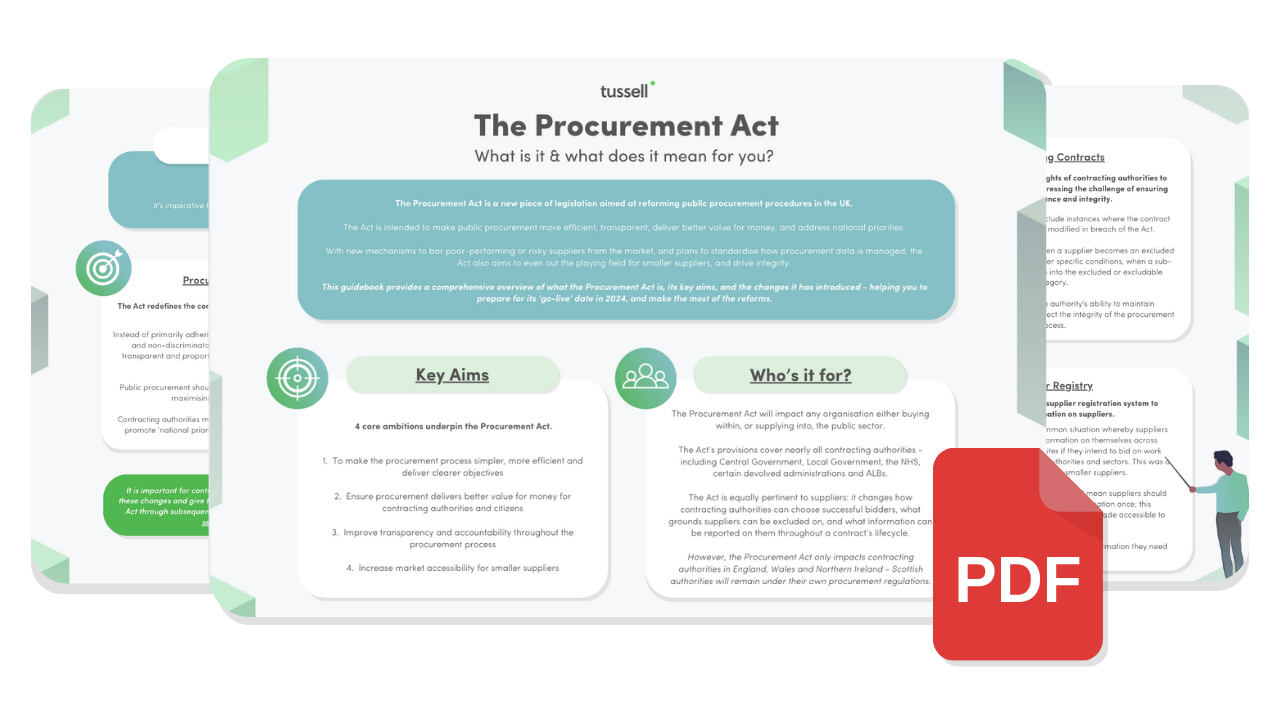The Procurement Bill is now working its way through the UK's legislative process. From 26th October 2023, the Bill with become law and will be known as the Procurement Act.
***
This article is part of a series of articles on the 2023 Procurement Act.
Head to Tussell's Procurement Act Hub for all the information and resources you need to get Procurement Act ready.
So, what is the Procurement Bill and how will it affect you?
With “1 in every 3 pounds of public money, some £300 billion a year, [being] spent on public procurement”, the highest spend to date, and the UK's exit of the European Union, procurement has risen to the forefront of politics. This has created the challenge of replacing the current 350+ different procurement regulations that are spread over various regimes.
The Procurement Bill aims to consolidate all of these into one regime that hopes to be quicker, simpler and better suited to the needs of the UK, bringing the procurement system to the modern day and ensuring that every pound goes further.
Alongside this, the Bill hopes to make the procurement system more transparent and have integrity at its foundations so it can be tough on fraudsters and poor performers. By doing this, it hopes to make the procurement markets more accessible for SMEs and to ensure that public money goes further.
The Bill started in the House of Lords in May 2022 and is made up of 116 clauses, over 13 parts and 11 schedules - making it very complex. It is expected to become law in March 2023.
The Bill focuses on improvements in four areas:
1️⃣ Reform of the procurement process and legislation to increase speed and simplify it
2️⃣ Make procurement and the process better value for money
3️⃣ Improve public benefit through an increase in transparency and accountability
4️⃣ Benefits for SMEs through innovation, including a new digital infrastructure
Overall the Bill has been created based on principles of transparency, non-discrimination, value for money, public benefit and accountability.
The key changes in the current version of the Bill are:
-
The establishment of a single legal framework for the awarding of contracts by contracting authorities. This will include all public contracts, utility contracts, concession contracts, and defence & security contracts.
-
Contracting authorities will be subject to more in-depth and broader transparency scrutiny, making it easier to find out planned and completed procurement information.
-
Contracting authorities will also have the power to exclude suppliers from procurements due to poor performance, failure to meet KPIs and modern-day slavery evidence (the debarment list)
How will the procurement process and its legislation change?
The Procurement Process:
The Bill aims to reduce the number of individual procurement processes and collate them together into one larger, more flexible system, that would benefit all involved in procurement. The system has been designed in this way with the hope that it will give the procurement process more cohesion, regardless of the type of contract award.
However, there will be one exception in this new system: direct contract awards will still be allowed, but only in restricted circumstances, e.g. instances such as the need to “protect human life”.
A Digital Platform:
Alongside this, a new digital platform will be made where all suppliers register their details and potential bids, whilst a new central online transparency platform hopes to allow suppliers to see all opportunities in one place. It is hoped that this will reduce bureaucracy for authorities and suppliers, as authorities will have more information in the public domain, as well as accelerate spending with SMEs.
Choice of Procurement Procedures:
The Bill will reduce the current choice of 5 procurement procedures available to contracting authorities to just 2. The 2 types of competitive tendering procedures are proposed to be:
-
A single-stage tendering procedure without restriction on who can submit a bid
-
A competitive tendering procedure that the contracting authority deems appropriate which may involve limiting participation across stages
Transparency:
Another benefit of the new bill will be the ability to exclude suppliers where there is clear evidence of modern slavery. This will be done through increased transparency at every stage of the bill.
This idea of transparency is also built on further in the Bill through the proposed introduction of key performance indicators (KPIs) being published by the wider government rather than just the largest central government contracts, as the current system requires. There are ongoing discussions by politicians about the uniformity of working and framework standardisation of these KPIs. The concept of an increase in transparency has been widely welcomed across the procurement board but the question of too much transparency, particularly in certain areas, could cause more harm than good e.g. to the UK tech sector by giving away too much information to foreign competition.
If these levels of transparency do get passed within the Bill it would lead to the need for significant training for commissioner and provider staff so that they can understand and use the new tools and requirements including the digital platform.
To read the government’s summary of the Procurement Bill, click here.
How has the Bill progressed from the Green Paper?
On the whole, the current draft of the Procurement Bill stands true to the sentiments and ideas that the original the Green Paper contained.
However, there is one notable change - despite initial attempts to simplify procurement notices, there are still 12 types of notices mentioned in the Bill. This will be something for procurement professionals to keep an eye on.
You can find out more about what the Green Paper contained in our article Transforming Public Procurement Green Paper - why it matters.
What will the Bill mean for SMEs?
Although the Bill still has a long way to go, one thing that seems likely is the benefits it will bring for SMEs. By doing away with the complicated and bureaucratic systems, it hopes to give SMEs a much better chance at winning contracts within the public sector. In turn, the government would be able to benefit from the innovation and agile ideas that SMEs offer, ultimately leading to an improvement in the services for the public.
The Procurement Bill also looks certain to include a plan for a new digital infrastructure that will hold all of a supplier’s credentials, making it cheaper and easier for organisations of all sizes to write bids. By mandating that contracting authorities need to publish their procurement pipelines on this digital platform, it aims to allow SMEs to be proactive and anticipate when and where opportunities are coming from so that they can independently write well-researched bids that really nail what the buyer is looking for.
To find out more about how to build your pipeline of opportunities in the public sector, read our Tussell “how-to guide”, How to build a pipeline of public sector procurement opportunities.
What will the Bill mean for Contracting Authorities?
The headline takeaway is that procurement procedures will be simpler for contacting authorities, with authorities having the choice of only 2 procurement procedures going forward. The second of these, as aforementioned, gives contracting authorities the ability to have greater flexibility by being able to create the procedure themselves. It is hoped that this will allow for more negotiation with suppliers.
Alongside this, due to the updates surrounding the debarment list, contracting authorities will have greater transparency on the poor performance of suppliers, allowing them to manage their risk more effectively.
The digital platform is planned to be designed according to the Government Digital Service's Technology Code of Practice and Service Standard. As a result, under the new Bill, contracting authorities would be able to buy commercial systems from any provider they choose, as long as they reach these standards. This would give contracting authorities more choices, greater security and more autonomy. If the digital platform gets implemented in the way that is currently suggested, across-the-board training would be required to allow staff to use this platform correctly and to get the most out of it. There is no mention of standardised training in the Procurement Bill currently so it is assumed that any required training would be organised and carried out by the contracting authorities themselves.
Contracting authorities will always have to adhere to the Bill's aim for more transparent and open contracting. Therefore, contracting authorities will have to provide all associated tender documents with a tender notice (Section 20.3), as well as publish a contract details notice when required to. When dealing with contracts with an estimated value of over £2 million, contracting authorities will have to publish a copy of the contract within 90 days. Similarly, before the modification of a contract, the contracting authority must publish the details to that effect and publish a termination notice 30 days before termination.
Overall, the Bill would introduce a wealth of procedure changes that would impact the key dates within the process of awarding a contract - procedure changes that contracting authorities will need to understand and manage.
Looking to the Future…
The Procurement Bill has come a long way since it started out as the original Transforming Public Procurement Green Paper in December 2020 but on the whole, it still reflects the principles originally set out.
However, there are a few restrictions to bear in mind:
The Bill will only change public procurement in England, Wales and Northern Ireland. Scotland will remain under its own separate, but similar system. Scotland is not the only omission in the Procurement Bill - it does not currently cover NHS procurement and it does not look likely to include this in the final version of the Bill.
Nothing in the Procurement Bill is legally binding until the Bill completes the legislative process and is enacted into law. Until then, the current regulations and case law on procurement processes remain. The Bill is currently at the report stage in the House of Lords. All we can do now is monitor the development and progression of the Bill and try to prepare in the best way possible.
This article is part of a series of articles on the 2023 Procurement Act.
Head to Tussell's Procurement Act Hub for all the information and resources you need to get Procurement Act ready.-1.png?width=450&height=330&name=Procurement%20Act%20Hub%20Graphics%20(1)-1.png)
*
The Procurement Bill makes clear the importance of clear data when selling to the government - Tussell can help you with this. Book a personalised demo of the platform now to uncover the insights our data provides and how it can help you do more business with government.
If you found this article useful, or you're interested in receiving the latest insight on public sector spend and contracting, sign up to the Tussell newsletter!

















